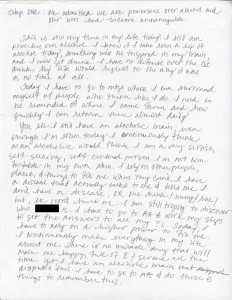This post originally appeared on I Read Odd Books
Book: The Eccentropedia: The Most Unusual People Who Have Ever Lived
Author: Chris Mikul
Type of Book: Non-fiction, compendium, encyclopedia
Why Do I Consider This Book Odd: Because it is a book devoted wholly to weird people.
Availability: Published by Headpress in 2013, you can get a copy here:
Comments: My love for all of Chris Mikul’s work is pretty well established by now so I won’t discuss in depth why I think he is and always will be an author worth reading aside from just stating that his love for the odd in this world makes his work very topical for me and for this site. I can’t imagine anyone will be surprised to learn that I think this is great book. Anyone with a love for strange ideas or eccentrics will need to add this book to their collection. The book discusses some usual suspects in the weirdo game, like Helena Blavatsky, Charles Fort, Aleister Crowley and Michael Jackson, but for every person whose name comes up all the time in compendiums devoted to eccentrics, there were ten more I had never heard of before.
Because this is quite literally an encyclopedia, the only way to discuss it is to outline a few of the more outlandish people featured in the book. Not the most exciting way to discuss a book but hopefully the lunacy of the people I select will make up for it. Here’s a short selection of some of the weird people I had not heard of prior to reading this book, and hopefully there will be a couple I discuss who will be new to you, too.
Baroness Eloise Wagner De Bosquet was a horse-faced woman with buck teeth whose force of charm made her very attractive to people, if only for a short period of time. After four divorces, in the early 1930s she persuaded two of her lovers to accompany her to Floreana Island, part of the Galapagos Islands chain, to join in with the settlers on the island. She wanted to create a hotel there, and while visitors to the island found her delightful, less so the two families who lived there permanently. The lover triad became abusive for one of the men, and The Baroness and one of her lovers disappeared, never to be seen again. In the wake of that disappearance, there were two more mysterious deaths associated with Floreana, no small feat for an island with fewer than a dozen permanent inhabitants.
I read Mikul’s entry about The Baroness and then immediately discovered a Netflix film called The Galapagos Affair. The film is an historical piece that covers all of the Baroness’ antics and the scandals and murders on Floreana Island. I recommend watching it because not only was it a pretty good movie, it also shows how The Baroness could possibly have had any sex appeal to the many men she attracted. In photos and a silent movie, she is surprisingly attractive. But still, if you are going to be a part of a cuckold-trio, it seems better to be in thrall to a really beautiful or rich woman. That way when your body is discovered on a desert island with no fresh water source, at least people will see your sorry end as the inevitable result of loving a very bad but extremely beautiful woman.
Next let’s discuss Percy Grainger, an Australian musician and composer. I was drawn to his entry in The Eccentropedia because he just seems so unlikely. Had he been a fictional character he would have seemed completely unbelievable. As a boy, his mother told him he was destined for greatness and encouraged him to practice piano for hours. She whipped him if she felt he was not working hard enough and those whippings became a part of his creative impulse as an adult. He eventually married a Swedish woman who both understood and did not mind that beating Grainger often was going to be an an important part of their marriage. Grainger liked whipping others but his masochism took up a lot of room in his psyche, as well as sex in general.
The whippings as a child worked because he became a prodigy, and his marriage to a Swedish woman was more or less inevitable because after a trip to pre-war Germany, Grainger became convinced of the superiority of the Nordic people. His admiration for the Nordic people leaned heavily into racism but he was also interested in and influenced by the Maori. He was a fan of Duke Ellington and counted Jews in the number of his friends, but he also created a weird language he called “blue-eyed English” wherein he eliminated all words that did not have an Anglo-Saxon origin and replaced them with his own creations. This was especially interesting for a composer to do, given all the Italian words used in music. This site has a short list of the words that Grainger created and is itself a good look at Grainger’s many eccentricities. Almost equally eccentric, I also discovered that Grainger had invaded unlikely realms online, notably Tumblr and Pinterest tags related to “hot dead guys.” (On a related note, who knew how ridiculously handsome Anton Chekhov was? Well, evidently lots of people, but I certainly didn’t until I looked up Percy Grainger.)
I am unsure if I really consider Benjamin Lay to be a true eccentric as much as I consider him an excessively-devoted moralist, but the picture Mikul paints of his activities is pretty memorable. Born in England, Lay first encountered slavery in 1730s Barbados, which made him become a staunch abolitionist. He and his wife, both Quakers, later emigrated to Philadelphia, where he found that some of his fellow Quakers were slave-owners. Lay was not one to be subtle in his advocacy. When he got tossed out of a church for being disruptive, he stretched out in front of the entrance so that everyone who left had to step over him. On other occasions, he engaged in some one-man theater that is both funny and dramatic:
He invaded another meeting wearing a military uniform with a sword, and carrying a hollowed out book (to represent the Bible) in which was concealed a bladder containing pokeberry juice. Declaring that enslaving a man was no better than stabbing him through the heart, he drew the sword and plunged it into his ‘Bible’, spattering those nearest him with the red juice. He once sat outside a meeting in the middle of the winter with one bare leg deep in the snow. When passersby expressed concern, he said, ‘You pretend compassion for me, but you do not feel for the poor slaves in your fields who go all winter half clad.’ He was not afraid of taking direct action, and once went so far as to kidnap a slave owner’s three-year-old child, so he would know how it felt to lose a loved one.
It also bears mentioning that Lay was a hunchback, rendering him 4’6″ tall. He died happy because on his death bed, just before he died, the Quaker church had voted to reject slavery. I wonder how much his activism led them to adopt their moral stance.
My favorite entry was Eliza Donnithorne, the woman who was likely the inspiration for Dicken’s Miss Havisham in Great Expectations . Eliza was born in India where her father was a judge. Her mother and two sisters died during a cholera outbreak and her heartbroken father decided to relocate to Australia, moving there with the young Eliza in 1836. When it came time for Eliza to entertain suitors, she rejected all of her father’s favorites, falling for a shipping clerk named George Cuthbertson. When George proposed to Eliza, her father, known for having a very bad temper, informed George that if he ever caused Eliza any anguish after the marriage, he would be severely punished.
. Eliza was born in India where her father was a judge. Her mother and two sisters died during a cholera outbreak and her heartbroken father decided to relocate to Australia, moving there with the young Eliza in 1836. When it came time for Eliza to entertain suitors, she rejected all of her father’s favorites, falling for a shipping clerk named George Cuthbertson. When George proposed to Eliza, her father, known for having a very bad temper, informed George that if he ever caused Eliza any anguish after the marriage, he would be severely punished.
And we all sort of know what happened next. George jilted Eliza on the day of their wedding. Eliza believed he would eventually arrive and remained in her wedding dress the entire day. She came unhinged when she saw wedding guests consuming food meant for the wedding banquet. Concerned friends took her to her room, where she remained for a month, but honored her request that the wedding banquet be left alone and the dining room door locked. Unfortunately Eliza was pregnant by George, and when she gave birth the baby was given to a servant to raise, to preserve Eliza’s reputation. Perhaps that was why George ran away – the prospect of a baby born seven months after the wedding, given Mr. Donnithorne’s threats regarding bad behavior, probably gave him pause.
Eventually Eliza’s father died and she inherited his estate, but that did not encourage her to resume normal life. She had spent years waiting for George to return to her, and had descended completely into madness.
After his [her father’s] death, she had all the shutters on the windows of the house nailed up, and dismissed all but two of her servants… relying on them to conduct all her business with the outside world. She continued to wear her wedding dress, and the dining room with its uneaten feast remained locked.
It was never wholly proven that she was Dicken’s inspiration, but it seems very likely that at some point he heard her story – the descriptions of the two women seem just too similar for coincidence. Stranger things have happened though.
This is one of my shorter discussions but to discuss it too much would ruin the nature of the book. Encyclopedias don’t lend themselves well to my typical in-depth discussions. This encyclopedia especially doesn’t, given its substantial length (over 500 pages) and 266 entries that cover almost all forms of human perversity, insanity, determination and genius. This book also has some excellent illustrations by Glenn Smith. While I completed this book in two sittings, this is a book that can be read in fits and starts, a great book to read when you suspect you may face interruptions, like waiting in line at the DMV. Mikul, while he can write fiction well, uses a style in this book that is a mix of journalism with clear affection for the subject matter, ensuring the book is readable and engrossing. I loved this book and highly recommend it!

